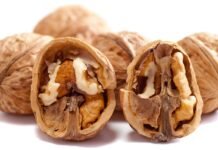We all experienced brain fog at least once in our lifetime. The condition has an official name – chronic fatigue syndrome – and comes with symptoms of haziness in the thought processes, confusion, dizziness, slow thinking, focus/attention deficits, lack of concentration, and forgetfulness among others.
We should not mistake it with other conditions, as sometimes such symptoms can appear after a bad night’s sleep, the occasional low blood pressure, a hangover, or other health problems. For you to receive a diagnosis of chronic fatigue syndrome (or brain fog), you should experience more than six months of permanent fatigue, from both a physical and cognitive point of view.
From a dietitian point of view, one of the most concerning aspects related to brain fog is the correlation between the foods we eat and the symptoms of the illness. The saying “we are what we eat” seems to apply in this case. Recent studies show there are positive correlations between brain fog and gluten intolerance, celiac disease, and other intestinal health issues, among others.
Since brain fog affects the functions of your brain from a physical and psychological standpoint, it is only logical to consider eliminating foods that lead to brain fog and introducing foods that boost brain health and activity to our diets. Today, we will discuss five foods you should avoid if you experience brain fog and fatigue syndrome.
1. Gluten
Even if you do not experience severe gluten intolerance symptoms or celiac disease, in time gluten can lead to inflammation. Inflammation as the root of most evils is still a young field of study in medicine, but we have promising results. Inflammation seems to increase brain fog and enhance its symptoms as it links to low-grade over activity of the immune system.
New studies say that the underlying cause of brain fog symptoms is higher levels of inflammatory molecules, including adipocytokines and histamines, which stimulate the activity of microglia – brain cells involved in the immune defense system of the central nervous system.
In other words, ditching gluten may clear your head – literally – and help you live a healthier life, free of joint pain, other gluten intolerance symptoms, inflammation, and immune system’s long-term problems.
2. Sugar and Artificial Sweeteners
All dietitians and doctors will tell you to cut back on sugar to prevent the development of a wide area of diseases and health problems. Refined sugar is your enemy, leading to diabetes, cardiovascular disease, bad cholesterol, and brain fog.
Many people use sugar to boost their brains and get some energy, but this enhanced activity lasts for a short while. Moreover, we all know that sugar represents empty calories and can lead to sugar addiction. When we speak about sugars, we have to speak about the bad carbs we also eat without paying attention to the consequences.
Refined carbs, white flour, refined sugar, corn syrup, and other similar products link with inflammation and even yeast infections. Do we have to say that yeast infections correlate with brain fog and other fatigue syndrome symptoms?
Artificial sweeteners are dangerous from many points of view, being able to impair your brain functions over time. Aspartame toxicity is a severe factor triggering numbness, mental confusion, headaches, and balance issues, among others.
3. Alcohol
Alcohol leads to brain fog and we are not talking about the occasional hangover. We all know alcohol is bad for our health, but science focuses on the direct link between alcohol and brain fog. While not a food, alcohol has to be on this list because the very wide area of damages it leads to. For instance, beer contains gluten, and we already learned that gluten correlates with brain fog.
Moreover, alcohol contains histamines that cause allergic-like reactions in people. A diet low in histamines present in alcohol and other foods seem to alleviate brain fog symptoms. If you are sensitive to the common allergens, you may also experience a high sensitivity to the histamine in alcohol, thus experiencing more intense brain fog symptoms.
4. Dairy
It is sad news, we know, but dairy can lead to brain fog, especially in people who are lactose intolerant. Being sensitive to dairy does not necessarily mean you have an allergy, but if you experience gastro-intestinal discomfort and light-headedness, you may link dairy consumption with brain fog. If you look at the FDA list of foods to keep an eye on, milk is the number one allergen. Being sensitive and/or allergic to milk and milk-based products correlates with experiencing brain fog symptoms.
The problem with dairy is tricky. We need the calcium and the other minerals and good ingredients in dairy products, but you should also prevent brain fog in case you experience it. Luckily, your dietitian can offer you the proper alternatives to dairy, so you do not have to live a sad, cheese-free life.
5. Bacon
Now, this is incredibly sad news, but we have to face the facts: bacon does not come only with tasty flavors and meaty delights, but also with sodium nitrite, sodium nitrate, and sodium/potassium benzoate. These are the most common salts and additives the food industry puts in your meats to give them flavor and help them last for longer.
We hope we do not have to mention the other food additives and enhancers you consume with the bacon. Some color the food so it becomes appealing to your eyes; others enhance the taste, while others replace the natural nutrients in the food after it loses them through processing.
The problem with salts, colorant, and additives in bacon is that they may be “safe” in the eyes of the FDA – in regulated amounts, of course – while they are Group 1 Carcinogens in the eyes of the World Health Organization. Brain fog is just one of the symptoms people complained about after eating bacon and industrially cured/processed meats. Respiratory problems, allergies, skin rashes, gastro-intestinal issues, headaches, and dizziness were the other most common negative effects of bacon.
Conclusion
While it is hard to eliminate all these foods, drinks, and ingredients from your diet in a quick sweep, you can start slowly, by moderating their consumption and replacing them with healthier versions. If you experience brain fog, speak to your doctor for a differential diagnosis. If you ruled out other medical and psychological problems, you need to turn to your dietitian for a healthier meal plan and a lifestyle strategy to alleviate brain fog and prevent other illnesses.
Image source: reachout.life


























